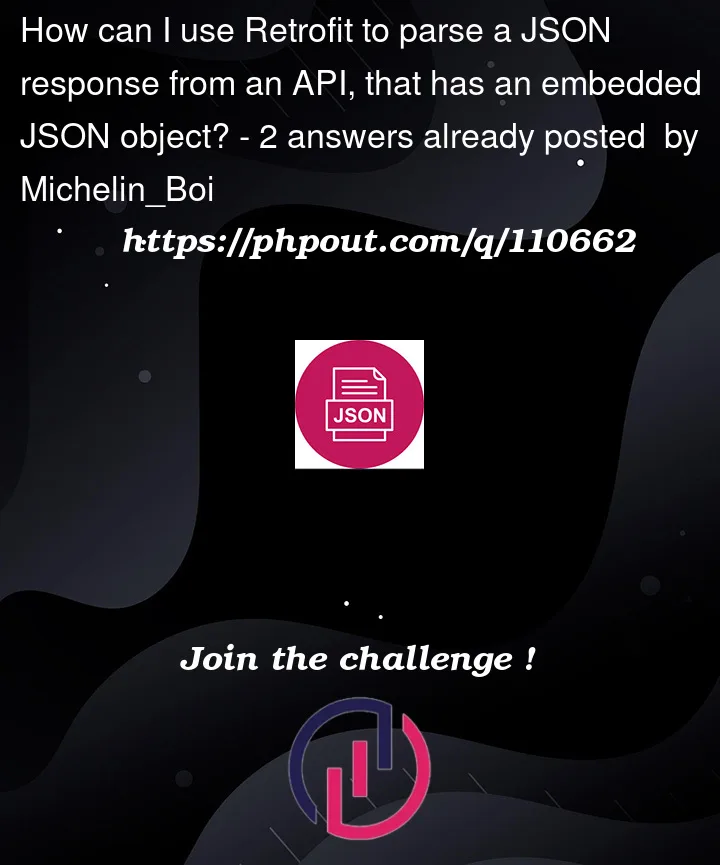I’m trying to learn Android Development by making a bus arrival timing application that makes API calls to a local API that has the arrival timings for the next 3 buses. I am using Kotlins and Jetpack Compose to help. This is a sample of the JSON response I get:
{
"odata.metadata": "http://datamall2.mytransport.sg/ltaodataservice/$metadata#BusArrivalv2/@Element",
"BusStopCode": "65199",
"Services": [
{
"ServiceNo": "89",
"Operator": "SBST",
"NextBus": {
"OriginCode": "64009",
"DestinationCode": "64009",
"EstimatedArrival": "2022-12-22T22:15:06+08:00",
"Latitude": "1.3947326666666666",
"Longitude": "103.89898083333334",
"VisitNumber": "1",
"Load": "SEA",
"Feature": "WAB",
"Type": "DD"
},
"NextBus2": {
"OriginCode": "64009",
"DestinationCode": "64009",
"EstimatedArrival": "2022-12-22T22:31:36+08:00",
"Latitude": "0",
"Longitude": "0",
"VisitNumber": "1",
"Load": "SEA",
"Feature": "WAB",
"Type": "DD"
},
"NextBus3": {
"OriginCode": "64009",
"DestinationCode": "64009",
"EstimatedArrival": "2022-12-22T22:47:51+08:00",
"Latitude": "0",
"Longitude": "0",
"VisitNumber": "1",
"Load": "SEA",
"Feature": "WAB",
"Type": "DD"
}
}
]
}
I have been following the code labs on Android Documentation and tried to store the results into a Data Class in Android as shown below. I don’t think I am doing it right for the JSON objects NextBus, NextBus2 and NextBus3. Thank you
SingaporeBus.kt
package com.example.busexpress.network
import kotlinx.serialization.SerialName
import kotlinx.serialization.Serializable
import kotlinx.serialization.json.Json
@Serializable
data class SingaporeBus(
@SerialName(value = "ServiceNo")
val busServiceNumber: String,
// Bus Arrival Timings
@SerialName(value = "NextBus")
val nextBus1: Json,
@SerialName(value = "NextBus2")
val nextBus2: Json,
@SerialName(value = "NextBus3")
val nextBus3: Json
)
@Serializable
data class NextBusTiming(
// Date-Time expressed in the UTC standard, GMT+8 for Singapore Standard Time (SST)
@SerialName(value = "EstimatedArrival")
val estimatedArrival: String,
@SerialName(value = "OriginCode")
val startingBusStop: String,
@SerialName(value = "DestinationCode")
val endingBusStop: String,
// Current Bus Occupancy Levels
@SerialName(value = "Load")
val busOccupancyLevels: String,
// Wheelchair Support
@SerialName(value = "Feature")
val wheelchairAccessible: String,
// Bus Type
@SerialName(value = "Type")
val vehicleType: String,
// Bus Approximate Location
@SerialName(value = "Latitude")
val latitude: String,
@SerialName(value = "Longitude")
val longitude: String
)




2
Answers
Each object stored in Json should have its own representation in
data class.kotlinx.serializationautomatically handles nested objects.So your
SingaporeBusmodel should look like this:I hope this answer helps you
The code you’ve written should be like this
Although The code can hove some improvements :
1.If you used Retrofit you would be able to use @SerializedName instead of @SerialName and in that situation your class should use
@Parcelize and the data class implemented Parcelable interface
this is retrofit sample for your api call :
2.It’s better to not use value declaration in for example in
@SerialName(value = "ServiceNo")
3.If you access the server json fields shouldn’t start by Caps for example "ServicesNo" and they could be camelCase
4.According to Uncle Bob naming of fields should be clear and doesn’t have comments like this :
5.Finally you can have different classes for use them easier at other Classes for example NextBusTiming may have other usage in future and in this you can find it better than being in same class or Kotlin files actually.